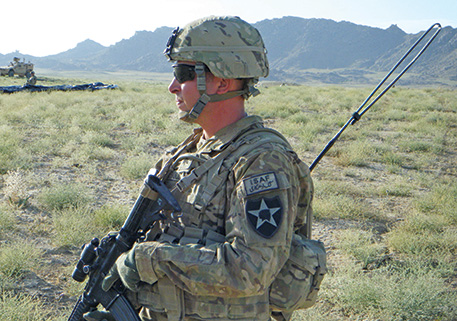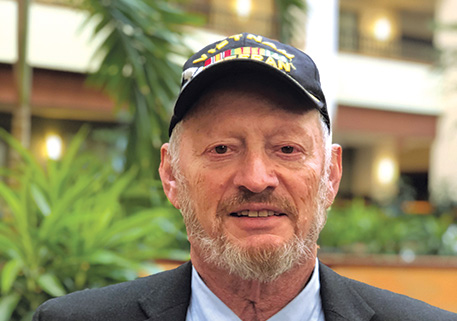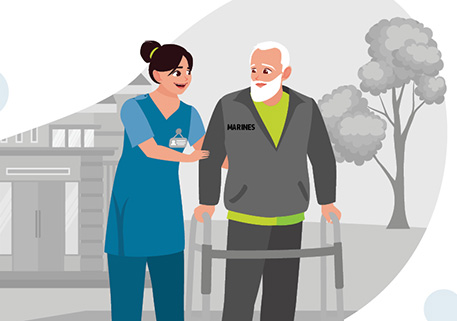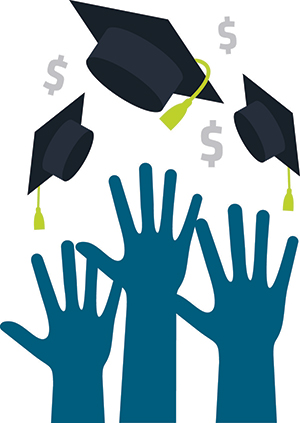 Since 2001, DAV has awarded more than $1.7 million in scholarships to students who’ve volunteered for veterans. We recently caught up with several of them to hear how the scholarship has helped them with their goals and academic pursuits.
Since 2001, DAV has awarded more than $1.7 million in scholarships to students who’ve volunteered for veterans. We recently caught up with several of them to hear how the scholarship has helped them with their goals and academic pursuits.
DAV Scholarships stem from our recognition of the important role volunteers play in care teams at Department of Veterans Affairs medical centers. The veteran-focused volunteer programs DAV supports at the VA and beyond facilitate students’ early interactions with men and women who’ve served and enrich their understanding of what specialized veteran-focused care looks like and what it means to give back.
“What we have heard time and again from the students we talked to was that the simple act of lending a helping hand to veterans in need has had a profound influence on the trajectory of their lives,” said National Voluntary Services Director John Kleindienst. “The outcome of awarding these scholarships has been more than helping a student through school—it’s been a worthwhile investment in the future of these young men and women that’s returning dividends.”
Here are some of their stories.
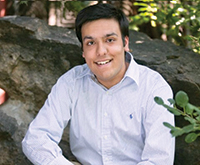

2021 – $7,500 DAV Scholarship
A high school history class sparked Anit Tyagi’s desire to volunteer with veterans. Through his study of U.S. policy and history, he realized that one of the core values the United States was founded on was liberty.
“And no other group of people has done more to ensure the U.S. remains free than veterans,” he said. “To this day, I still believe that liberty animates the U.S. and its people.”
He wanted to meet and hear the stories of those veterans, so he started volunteering at the Rocky Mountain Regional VA Medical Center in Denver. His first experiences were in the emergency department, primarily keeping veterans company but also escorting them to the radiology department, changing bedsheets and restocking medical supplies. Eventually, while still a high school student, he volunteered to be with veterans in palliative and hospice care.
He said this experience helped him develop his emotional maturity while giving him a deeper appreciation for the people he was around.
“Every veteran I sat with had a different story, and each story was riveting, and it was unique and different,” said Tyagi. “And I thought it would be such a waste if this story wasn’t heard by more people.”
These thoughts led Tyagi, as a volunteer, to develop a program to record conversations with veterans at the VA. The recordings would preserve veterans’ stories not only for their families but also for inclusion in their medical records for the VA medical care team’s use. He said research shows that doctors and nurses who know more about their patients’ stories and personal information are able to deliver better care to them.
Tyagi currently studies chemistry and molecular biology at the University of Denver. His long-term goals include going to medical school and eventually practicing medicine, perhaps in geriatrics, oncology or neurology.
He thanks his volunteer experience and the DAV Scholarship for leading him on this path, and he encourages other students to look into these opportunities.
“Volunteering is a way of giving back to the community as well as feeling like you’re part of a system that’s bigger than yourself,” Tyagi said.
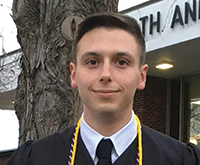

2016 – $7,500 DAV Scholarship
Growing up, Brandon Bemis knew what the VA and DAV were. His mom was a social worker at the VA medical center in Little Rock, Arkansas, and he frequently participated in Boy Scout service projects for DAV.
But around 2014, Bemis’ brother encouraged him to get more involved and volunteer inside the VA with him. The experience was life-altering.
Bemis volunteered with the physical therapy and occupational therapy teams, escorting patients, getting supplies, cleaning the facility and putting away equipment.
“Working in physical and occupational therapy, we spent a lot of time with those patients,” Bemis said. “They’re very vulnerable, and there’s a lot of very real conversations that we had with them. And so, I feel like I got a really great insight into the heart that those guys have for the sacrifices that they made. It gave me a really, really amazing insight into what a true servant’s heart really looks like.”
While he didn’t have hands-on responsibilities with patients, he witnessed the therapists doing their work and said he saw examples of a servant’s heart in them as well.
“[The VA] set me up with the absolute best role models I could have asked for, just seeing how they conducted themselves and the way that they treated their patients,” Bemis said. “They set the very highest standard.”
That VA experience led him to earn the volunteer hours he needed to qualify for a DAV Scholarship, but it also led him to his desired career path. He finished his undergraduate program at the University of Central Arkansas and is almost finished with his Doctor of Physical Therapy program.
“So it completely changed my career trajectory with what I wanted to do,” he said. “We got to see just the kind hearts and the motivations behind the therapists that work there. And so that really helped me fall in love with what physical and occupational therapy is able to do for any patients in general, but especially veterans.”
Looking back, Bemis said he can’t imagine not having the insight that volunteering gave him.
“I think it’s a really great way to find out what you have a heart for,” he said.
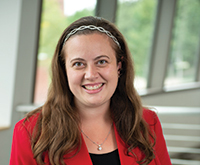

2009 – $7,500 DAV Scholarship
2013 – $5,000 DAV Scholarship
Jeralyn Westercamp’s parents instilled in her from an early age that people have three things—time, talents and treasures—that should be used to benefit others and make an impact.
As early as middle school she used time during long car trips with her family to draw and color turkey cutouts to give to veterans staying at VA medical facilities around Thanksgiving.
When she was in high school, that effort evolved into working inside the VA facility in Iowa City, Iowa, where she put together mini care packages that included handmade crossword puzzle boards to keep veterans occupied. She also transported veterans around the hospital and frequently worked at the front desk greeting people as they came in.
“When you talk about how volunteers help, I think it’s just showing patients that people care,” Westercamp said. “Because, too often, people assume hospitals are just dollars and healing.”
Because of that volunteer time, she qualified and applied for a DAV Scholarship. She received her first award in 2009 when she was triple majoring in marketing, management and political science at the University of Iowa. Her second scholarship award came during her Master of Health Administration program. The scholarship helped relieve her of the financial burden that came with college. She didn’t have to get a part-time job but instead was able to get involved with extracurricular activities such as student government.
“I think that’s one piece that’s really important, because the financial support allows you to focus on more than just surviving through school,” Westercamp said. “It allows you to do those extra things, and when I look back at college, it’s those extracurriculars really that have made even more of an impact than academics.”
Today, Westercamp is still helping others. When the COVID-19 pandemic hit, she used it as an opportunity to pivot from her career in health care administration and went back to school to get her Master of Business Administration degree. She wanted to find a role that she felt could make more of an impact.
She now works to connect students and entrepreneurs with mentors through the John Pappajohn Entrepreneurial Center at the University of Iowa.
She credits the DAV Scholarships with allowing her to have the time to receive mentorship from people and wants to make sure others have similar opportunities.
For more information about DAV Scholarships and to apply, visit davscholarships.org.




